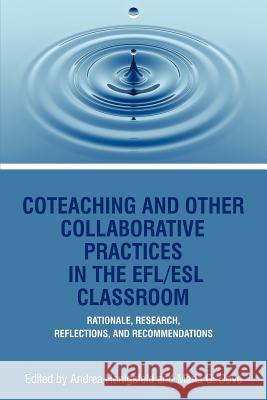Coteaching and Other Collaborative Practices in the Efl » książka
Coteaching and Other Collaborative Practices in the Efl
ISBN-13: 9781617356865 / Angielski / Miękka / 2012 / 318 str.
Much has been written about the cognitive and academic language needs of those learning English as a new language (be it a second language in the United States or other English-speaking countries or as a foreign language in all other parts of the world). Many guidebooks and professional development materials have been produced on teacher collaboration and co-teaching for special education, inclusive classrooms. Similarly, much has been published about effective strategies teachers can use to offer more culturally and linguistically responsive instruction to their language learners. However, only a few resources are available to help general education teachers and ESL (English-as-a-second-language) specialists, or two English as a foreign language (EFL) teachers (such as native and non-native English speaking) teachers to collaborate effectively. With this volume, our goal is to offer an accessible resource, long-awaited by educators whose individual instructional practice and/or institutional paradigm shifted to a more collaborative approach to language education. Through this collection of chapters, we closely examine ESL/EFL co-teaching and other collaborative practices by (a) exploring the rationale for teacher collaboration to support ESL/EFL instruction, (b) presenting current, classroom-based, practitioner-oriented research studies and documentary accounts related to co-teaching, co-planning, co-assessing, curriculum alignment, teacher professional development, and additional collaborative practices, and (c) offering authentic teacher reflections and recommendations on collaboration and co-teaching. These three major themes are woven together throughout the entire volume, designed as a reference to both novice and experienced teachers in their endeavours to provide effective integrated, collaborative instruction for EFL or ESL learners. We also intend to help pre service and inservice ESL/EFL teachers, teacher educators, professional developers, ESL/EFL program directors, and administrators to find answers to critical questions.











